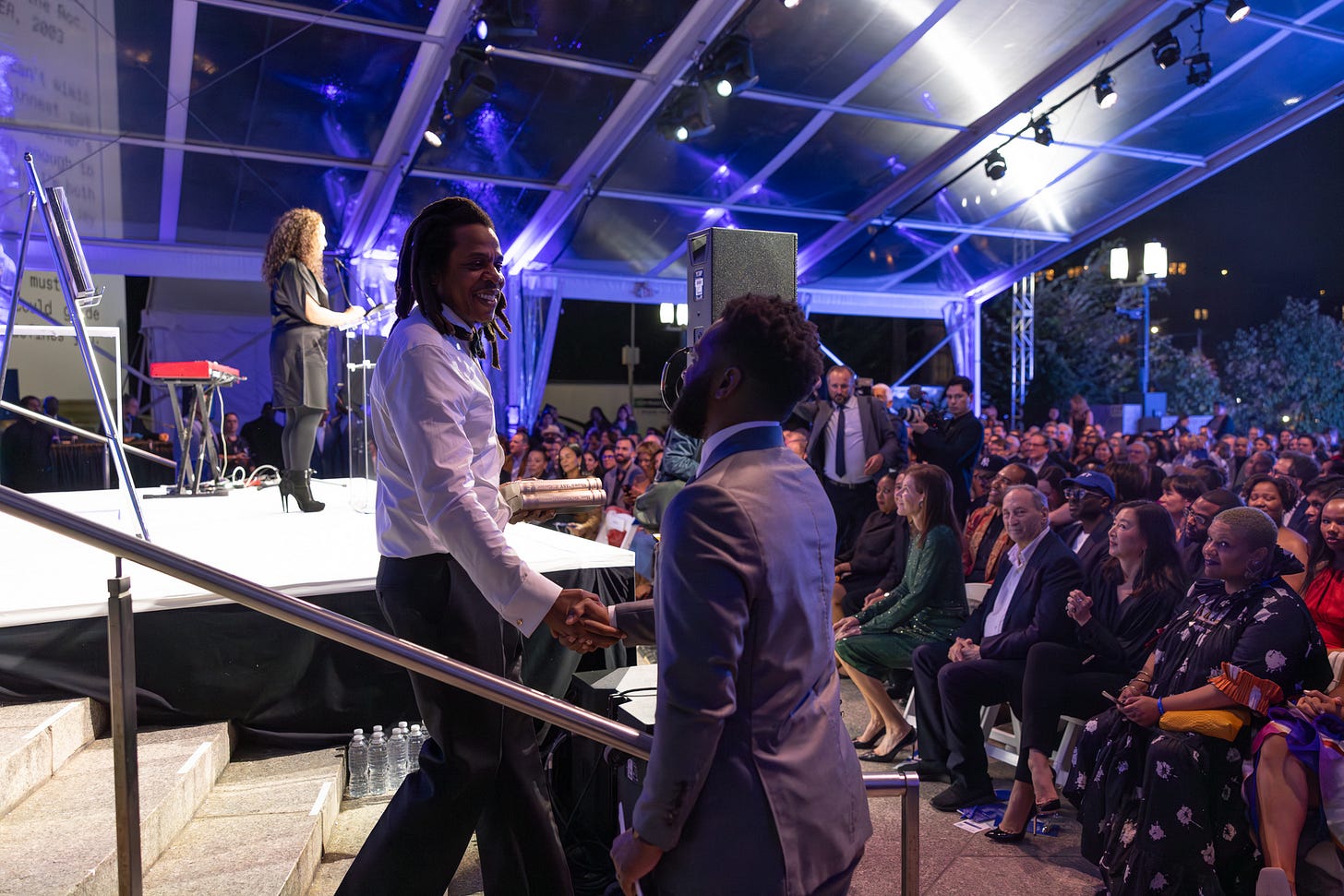Not Compatible with Older Models
Plus, me and Jay-Z, and the season finale of America Outdoors this week.
Yes, that’s JAY-Z shaking my hand and congratulating me on hosting the Brooklyn Public Library’s annual gala where we honored him and his mother Gloria Carter last week. I have, in fact, washed this hand, but it was a hard call. To MC for one of the greatest MCs was a life-winning moment for me.
Hi you,
A shorter prologue this week as I finish the promotional marathon for the season finale of my PBS series, America Outdoors. In this last episode, we feature Maine and ask how and why people embrace cold weather relationships with nature. Check out the show and the digital companion series, and let me know what you think.
I’d also like to plug my Puck partner Julia Ioffe’s excellent podcast miniseries all about the origins of Vladimir Putin, About a Boy. The first two chapters are available now, and there’s another dropping later this week. I promise the first episode will change your understanding of World War II.
Oh, and a shout-out to reader Alison Mason, in New York City. A few weeks ago, I wrote about Apple’s new environmental bragging rights ad featuring Octavia Spencer as a pleased Mother Nature. Alison pointed out that Chiffon margarine pulled off a similar stunt decades ago.
Since putting together this email on Friday, I’ve been watching the events in Israel and Gaza unfold with increasing horror and sadness. I found this post on Instagram to capture many of my own current feelings. For very different, valuable, and impassioned perspectives closer to the ground, see posts by Noa Tisby and Ahmed Eldin.
Alright, on to the main event, a topic that’s been on my mind a lot lately. Thoughts/feelings/feedback? Message me at baratunde@puck.news, or simply hit reply to this email.
Catch-404
The digitization of our lives and livelihoods is leaving millions of Americans—particularly the elderly—on the wrong side of the digital divide. Is it possible to age-proof Silicon Valley?
I spend a lot of time in airports—such is the life of a Puck writer/TV host/public speaker—and recently found myself sitting at an ersatz Japanese restaurant in Newark International Airport. (Yes, it’s actually nice now.) As I prepared to eat, I noticed an older woman sitting across from me, in her 60s or early 70s, staring at the table with a frustrated expression. I immediately recognized her pain.
Moments earlier, after all, I had the same look on my face as I struggled to navigate a slow and poorly-designed digital menu and payment process that could have been easily bypassed with the simplest human interaction. But the woman across from me didn’t have a smartphone. Sure, she was comfortable enough with the modern world to acquire a plane ticket, and had managed to traverse the gauntlet that is TSA. But when it came to meeting her basic need for sustenance, the QR codes at Newark had her stumped. Eventually, a few of us sitting around her flagged down an elusive employee.
There’s nothing new about humans struggling with technology, but that moment has stuck with me because it involved public embarrassment and a failure to satisfy one of our most basic human necessities. It felt inhumane and dystopian. Both the customers and employees were forced to interact with machines rather than each other, and when that process didn’t work as planned, we were all put in an awkward position through no fault of our own. The fault lay with the speed and manner with which we are thoughtlessly deploying new technology across an increasingly wide swath of our lives.
Remember the ’90s when our entire society was really excited to get online? We called it “the information superhighway,” and the goal was mass adoption. AOL physically spammed us with CD-ROMs, Microsoft built Internet Explorer into Windows, and I did my part too. As a college student between 1995 and 1999, one of my many campus jobs was to onboard students to the campus network and provide tech support. Things going wrong with technology literally helped me pay for my degree.
Around that same time, many of us began ringing the alarm about the digital divide, a growing chasm between haves and have nots in our newly connected world. I was personally sensitive to this point, especially when it came to low income and Black communities. (In fact, during the first decade of the 2000s, statistics showed how much more online certain marginalized communities were, and how much mobile and social media usage skewed to Black and brown communities (hello, Black Twitter!).) Over the last decade, of course, our focus has turned to concerns about screen time, mental health, data exploitation, and misinformation. The conversation about the digital divide faded into the background. But the problem didn’t go away, and it should worry us now more than ever.
You can read the full piece in Puck with analysis, inclusion of comments from folks on my IG, and most importantly, ideas for what we do about it.



My son, husband, and I just watched the Oregon episode on PBS. That was really really special.I don’t know how to form words around it, but it feels like part of healing and seeing each other. Thanks
Loved your series my friend. Especially the Oregon episode. You've added much to the quality of my life. Fred House